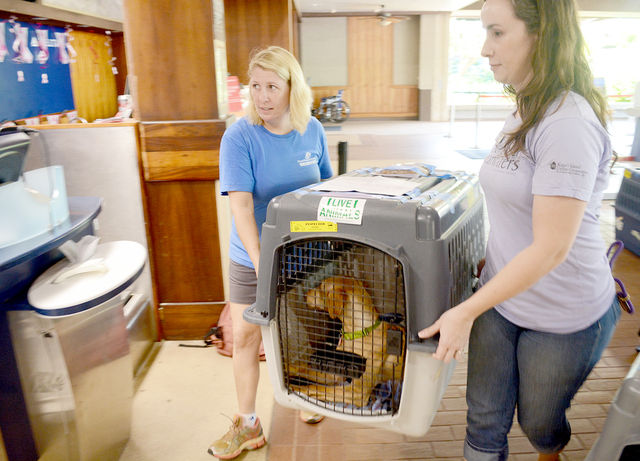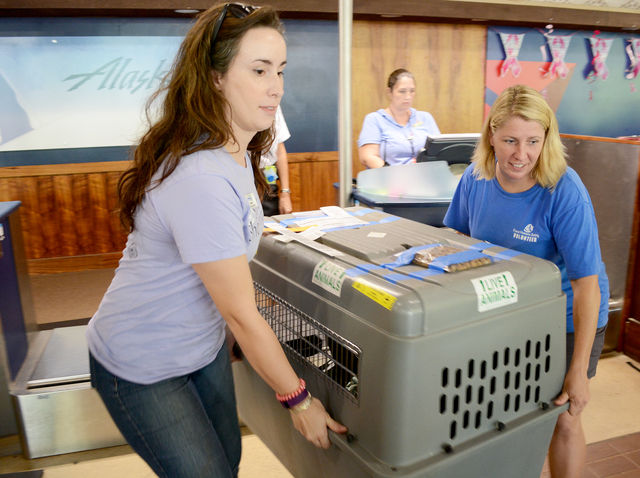LIHUE — Before placing the red dog named Cassidy back into his crate at the Lihue Airport, Carla Bissell held the dog’s head, kissed him gently and gave him a hug. The dog licked her face, then ducked a bit
LIHUE — Before placing the red dog named Cassidy back into his crate at the Lihue Airport, Carla Bissell held the dog’s head, kissed him gently and gave him a hug.
The dog licked her face, then ducked a bit as he returned to the gray, plastic crate, and the metal gate shut behind him.
Sounds like a sad goodbye. It wasn’t.
Cassidy, a former resident of the Kauai Humane Society, was about to begin a 2,500-mile trip to Marin County, California, where he would more than likely soon be placed with a home. His forever home.
He was one of about 20 dogs and cats sent on an Alaska Airlines plane, bound for the Mainland, Thursday through today. Once there, they are placed with rescue groups or shelters until they are adopted. And that generally doesn’t take long.
“These guys go real fast,” Bissell said.
The pet transfer program is setting records this year. Since Jan. 1, about 350 dogs and cats have been flown over the ocean, free on Alaska Airlines, including about 175 since June 1. That’s well up from 227 pets sent to the Mainland last year between Jan. 1 and Oct. 12.
“It saves a lot of lives,” said Bissell, a KHS volunteer. “It gives our dogs a chance to go into homes, and have good homes where they go on to have great lives.”
The program is simple, but effective.
An Alaska Airlines passenger, heading to San Diego, Portland, Seattle or Oakland on a nonstop flight from Lihue, agrees — weeks in advance — to sign for the pet, basically claiming it as baggage. The animal’s flight, which would normally cost about $300 if it was sent to the Mainland as cargo, is free per an agreement with Alaska, the only airline that provides the free transfer program for KHS.
KHS takes care of the reservations for the animals. At the airport, the dogs are checked in, weighed and their records and health certificates are reviewed. Transportation Security Administration tests each crate for drugs. The process has been ironed out over time and takes about five minutes for each animal.
“It seems really complicated and confusing until you do it a couple times, then you get the hang of it,” said Danielle Fisher, KHS employee.
With a finite number of homes on Kauai, and limited shelter space, the transfer program is one way to ease the island’s homeless pet population.
“It’s really taking off,” said Penny Cistaro, KHS executive director. “This has doubled our capacity for getting animals out. It’s been amazing for us.”
There are a few reasons for that.
The transfer program has been around for years, but through traditional media like newspaper, radio and TV, along with social media, it is gaining recognition and more people want to get involved. Hotels and stores like Petco and Natural Pet Hawaii are spreading word to their customers, too.
KHS has multiple people working on the program as well, and has become more proactive about finding resources.
It has established more partnerships with rescue groups, shelters and agencies on the Mainland and others, like Kitsap County in Washington state, have contacted KHS about taking pets.
Airedales, whippets and pit bull mixes of all sizes have been among those put on a plane going to the Mainland because people there want them.
“The animals that we have sent get adopted, usually in the first week they’re there,” Cistaro said. “They have this incredibly unique look you don’t get on the Mainland so those dogs go quickly because they’re unusual.”
It’s making a difference on Kauai.
The total number of dogs and cats taken in at the shelter, 3,698 for FY 2015, fell 16 percent from 4,380 the previous year. It was only three years ago that the shelter took in 5,717 animals.
According to a KHS report, 1,118 dogs (72 percent) and 531 cats (25 percent) were released from the shelter in the last fiscal year. All told, 438 dogs were euthanized (down 26 percent from 588) while 1,607 cats were euthanized (down 21 percent from 2,207) in the last fiscal year.
The transfer program is creating new ownership opportunities for dogs and cats as well as creating options for KHS.
“Sending them out enables us to take in and help more,” Fisher said.
The most expensive part of the program is the crates, which cost about $100. Those used to go and not come back. But now, shelters on the Mainland and Alaska Airlines have partnered to return them to Kauai.
“Kitsap just sent 39 crates back on a barge. It took six weeks to get them here, but we got them,” Cistaro said.
Volunteer Carol Ann Davis drove six cats and two dogs from the Puhi shelter to the Lihue Airport Thursday morning, and four more dogs in the afternoon in her truck.
One of them was Gus, a 5-year-old terrier/Airedale mix who seemed pretty nervous. He also received a kiss and hug and assurances things would be OK before being placed in the crate for his five-hour flight.
“He’s a wonderful dog,” Davis said. “When they get to Marin they’re going to have a home. And it will be a good home.”
Melissa Kos of California signed for the four dogs sent out Thursday afternoon. She heard about the transfer program through a friend.
“I’m happy to do this anytime I’ve over here,” she said. “It’s amazing.”
Kos said the canines probably find homes within days.
“They’ll be adopted. I’m sure of it,” she said.




